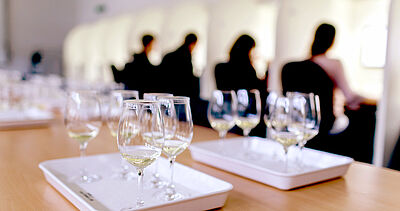Targeted winemaking
for the sensory improvement of non-alcoholic wines and sparkling wines
Background to the research project
The health risks of alcohol consumption are increasingly becoming the focus of national and European health policy. The production of non-alcoholic wines and sparkling wines is therefore of growing socio-political and economic interest. At the same time, interest in and willingness to buy non-alcoholic wines has been growing among consumers as well as in the gastronomy and specialist trade for several years. Improvements in dealcoholization technology have contributed to this, as has the increasing demand for a sophisticated food companion without alcohol and sweetness. However, the quality of many non-alcoholic wines that do not have the distinct aromatization that is common for products in the entry-level price range is unsatisfactory. They are unable to reproduce the sensory characteristics of the alcohol. Dealcoholization also results in the loss of wine aromas that give the wine its identity.
Processes used
The technological processes used for dealcoholization, vacuum distillation on the one hand and the combination of reverse osmosis and osmotic distillation on the other, are technically mature processes that are primarily offered as a service by specialized companies. Nevertheless, many non-alcoholic wines and sparkling wines lack varietal typicity, body and mouthfeel, often coupled with a diffuse green aroma reminiscent of stale beer. It is therefore hardly surprising that the consumer reach for non-alcoholic wines is currently only 0.6% of all potential consumers, while non-alcoholic beers already account for around 7% of total beer sales.
Project objective and responsibilities
Against this background, the aim of the project is to optimize grape processing and winemaking before and after dealcoholization in order to increase the typical varietal aromas and improve wine quality with microbiological metabolites and haptic substances.
As part of the project, Lisa Käppler is writing her doctoral thesis in the working group of Prof. Dr. Ulrich Fischer, where she is working on both the sensory and aroma-chemical analysis of dealcoholized wines. Before starting her PhD, she completed her Master's thesis here at the institute as part of her degree in food chemistry. She was already able to deal extensively with the topic of non-alcoholic wine during her studies and is now delving further into it with the start of her doctoral thesis.
Lisa Käppler reported on the research project at the 76th Palatinate Winegrowing Days in January 2023.
contact

Dr. Jochen Vestner

Lisa Kunz

